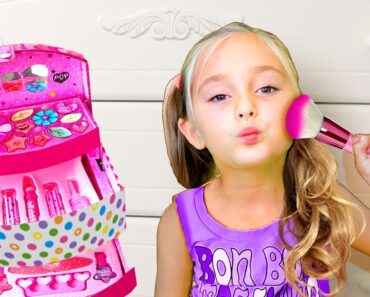Pushing a friend because they took a bite from their food bowl, hitting someone because they touched their toys, or biting someone because they did not know how to vent out their anger— these are common among young children. These instances show that they lack self-control.
Children do not develop self-control until they reach three to four years. Moreover, self-control is not an innate skill, and children must develop it with your help.
Children who lack self-control may often fall behind in their social lives and careers when they grow older. Let’s delve deeper into the what, why, and how of self-control in children in this post.
What Is Self-Control, And Why Should Kids Develop It?
Self-control is a skill that enables children and adults to practice restraint by managing their thoughts, emotions, feelings, and actions and not acting on their impulses. Some examples of self-control in children include
- Waiting for their turn in a line
- Sitting still in an auditorium when a performance is on
- Not throwing temper tantrums when they do not get something they desired
We develop self-control as we grow older. Children have limited self-control as the part of the brain that provides emotional control is still under-developed until about the age of three. This is why toddlers may show stubborn behavior, throw tantrums without thinking about the consequences, and often fail to understand a situation.
Developing self-control helps children make friends, build relationships, and find their way in life. Conversely, children who fail to acquire self-control can often struggle to form good social bonds, find a life partner, and lead a happy life later in life.
Why Do Some Children Struggle With Developing Self-Control?
Infants and toddlers constantly explore the world around them and are just developing a sense of individuality and independence. Even though children begin developing self-control around three to four years of age, they need guidance and help in controlling and channeling their emotions appropriately. Moreover, no two children are the same, and some children may struggle with self-control even as they grow up due to the following reasons.
Signs Of Lack Of Self-Control In Kids
Children who struggle to maintain self-control may often find themselves alienated from their peers and friends. Some problematic signs that children with poor self-control demonstrate include
- Having random and frequent outbursts
- Throwing tantrums
- Interrupting friends in class
- Blurting out in class
- Non-stop talking
- Being restless or excessively active
- Getting frustrated quickly and giving up
- Finding it difficult to await their turn
- Interfering in people’s conversations
- Impatience
- Inability to bear teasing, humor, or joke and ending up in tears
- Inability to take criticism
How To Help Children Develop Self-Control?
As a parent, you must ensure your child develops self-control as they are growing up. Children with limited self-control often find themselves in socially embarrassing situations, which further impact their self-esteem in the long run. Here are some ways you can help your child develop self-control.
1. Alter their thinking
A useful way to encourage your child to develop self-control is to change the way they think about a situation. Repeating instructions or giving them reminders before they face a difficult situation is a good way to prepare them for it mentally.
For example, if your child loses their cool when someone teases them in school, you can repeat instructions, such as “What do we do when someone teases you?” This way, your child is prepared for it. Another way to develop self-control in your child is to ask them for a solution to a problem. For example, asking them, “How do you want to solve the problem?” can keep them thinking and enable them to come up with creative solutions.
2. Help them understand their emotions
Young children often lack empathy and self-control and usually throw tantrums and don’t listen to you. It can be overwhelming for you, but you must understand that your child is trying to get a grip on everything around them.
They may be navigating multiple emotions and could be unable to communicate what they are going through, thereby leading to their irate behavior. Teach them words that can help them express their feelings and emotions better to help them develop self-control.
3. Modify their response
A good way to teach your childself-control is to help them understand how to modify their response to a complex or frustrating situation. Suggest actions or activities that they can do instead of lashing out or losing their self-control. Teach young children to cross their arms when they get angry to give themselves a hug or teach a school-going child to say, “So what?”, “Was that funny?” etc., to cope with bullying or teasing at school without taking it to heart.
Another useful way to modify your child’s response is by teaching them to distract themselves by counting the tiles, counting numbers backward, drawing, playing an instrument, painting, etc.
4. Set fixed rules with consequences
Children may find it challenging to follow the rules when they are young. However, it is still important to set rules and consequences. For example, you can tell your child,“Do not throw the toy, or you will not be able to play with it until tomorrow.” If your child does not abide by the rule, they face the consequence. After a few repetitions, your child will learn to follow the rules and gradually develop self-control.
5. Be a good role model
Children watch their parents and elders and imbibe their actions, words, and behavior. It may be a good idea to point out your own mistakes and demonstrate how you practice self-control. You could say, “I need some time to cool off because I am angry,” and then spend time alone in your room. Your child will pick up on such positive behavior and model it when they feel angry or frustrated.
6. Use positive reinforcement
A good way to teach children to develop self-control is by using positive reinforcement. Give your child a reward or a bonus for the times they show self-control under challenging situations. These reinforcements and rewards can act as a motivator and encourage your child to practice restraint and gradually become a part of their nature.
7. Implement time-outs
Time-outs are an effective tactic to help young children develop self-control. Give them a time-out when they do not obey instructions repeatedly. Keep the time-out short. You can set aside a ‘naughty stair’ or a ‘naughty chair’ and make your child sit on it as part of their time-out. You could also cut down their playtime or assign them chores for their irregular behavior.
8. Talk them through
Many young children become volatile or lose control because they are unable to vent out their feelings and emotions. If you notice your child losing their self-control in a situation, talk to them. Instill trust in them and let them know that you are always there for them if they need to discuss a problem. Not knowing whom to approach can be the reason for your child losing self-control. So, always keep the communication channels open.
If your child is old enough to understand things and yet is struggling to develop self-control, you can encourage them to think about what is causing them to react to a frustrating situation in a certain way. Teach them to think about why they are angry before responding to any situation, and compliment them when they practice restraint.
Self Control Activities For Children
There are plenty of fun activities and games that you can play with your child to help them develop self-control. Here are a few useful ones you can try.
1. Jenga
It requires slow and restrained movements and is apt for developing patience and self-control.
How to play:
The game consists of a tower that is built with blocks. The aim of the game is to pull out blocks from the bottom layers to create new layers on top without letting the tower fall.
- Set up and straighten the tower.
- Everyone gathers around the tower and takes turns to pull out blocks from the bottom layers and align them on the topmost layer.
- As the game proceeds, the tower becomes wobbly.
- The player in whose turn the tower collapses loses the game.
- Players can only use one hand at a time.
2. Simon Says
This is a fun game to play with your child. As they follow your instructions in the game, they will learn to be patient and practice self-control.
How to play
- The game requires at least three players.
- One person takes up the role of Simon, while the others are players.
- Simon stands in front of the group and tells players what to do.
- Every task given to the players must begin with “Simon Says…”
- For example, “Simon says touch your nose and hold it for five minutes” or “Simon says jump!”
- When Simon instructs without using the phrase “Simon says…” the players must not obey the order. For example, if Simon says “Jump!” the players should not jump. Those who do are out of the game.
3. Stoplight
Also called Red light green light, this game involves following instructions.
How to play
- You need a minimum of three players for this game.
- One person is designated as the ‘It’ or the traffic light and stands a good distance from the other players with their back facing them.
- When the ‘It’ calls ‘Green Light,’ the players should spin and move towards the ‘It’ until they call ‘Red Light.’
- On hearing ‘Red Light,’ the players must freeze in their spots.
- Any player who moves is out of the game.
4. Follow the clap pattern
This is a fun and easy group game that needs no props. Your child must follow the clapping pattern you begin, and each child adds to the clap pattern.
How to play
- You need a minimum of three players for this game.
- The first player starts with a clap.
- The second player begins with the first player’s clap and adds their pattern.
- The third player is expected to start with the first person’s clap, followed by the second person’s clap, and then add their pattern. This continues until one of the players messes up the pattern.
Self-control is crucial in life, and children must be encouraged to develop the skill as early as three years. There are many ways by which parents, teachers, and caregivers can help children develop self-control early in life and reinforce it as they grow older. Try the tips given in this post and help your child navigate difficult and tricky situations.


































